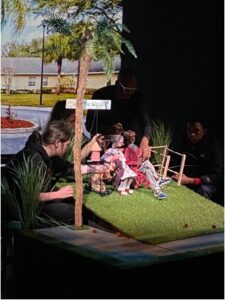
By Reagan Allen
In a dimly lit theater in Swain Hall, two puppets are illuminated on a small stage. Their names: Joyce and Willy.
The footlong puppets sit side by side on a miniature bench that rests on a plot of green grass. There is shrubbery on each side and to the left a palm tree with a small sign that says, “Live Well.”
Joyce is an elderly white woman with purple glasses and a head of gray hair. Willy, an elderly Black man with a red robe and a walker.
Instead of hand puppets and silly songs meant for children, this bunraku-style puppet show takes on a much more serious tone.
Handling heavy topics
In the show, Joyce and Willy meet by chance at a nursing home and have meaningful conversations about race, gender, and life. They explore racism, sexism, and how these topics impact society and those living in it.
Joyce’s seemingly clueless view about race in America is similar to Willy’s unknowing attitude towards sexism. Together they teach each other different perspectives about the world around them and those in it.
In emphasizing the importance of empathy and trying to understand the struggles others face, his puppet show questions identity and hardship as the two look back on events in their life.
The show indicates the cultural differences between Joyce and Willy — such as their favorite meals and early lives — all with an underlying tone of humor.
A dynamic duo
Tori Ralston is a co-creator of the show along with Tarish Pipkins, a.k.a. Jeghetto. Ralston teaches puppetry and interdisciplinary arts at North Carolina State University. She attended UNC-CH for undergraduate and then went on to University of Minnesota, Minneapolis to get a MFA in sculpture.
Joyce, Ralston’s puppet in the show, is based on a compilation of people that have inspired her. This includes different friends and a particular aunt that holds a special place in her heart.
Jeghetto worked as a barber for more than 20 years until he moved to North Carolina to kick-start his career in puppetry.
Black puppets are uncommon; Black puppeteers even more so. Jeghetto wants to emphasize the importance of Black puppeteers working with Black puppets.
The two puppeteers have collaborated before and have a long history together.
Jeghetto started by doing street performances with his puppets and, after a few years, started working with Paperhand Puppet Intervention. The organization uses a variety of styles of puppets to create performances that promote social change.
Puppets? For real?
As a child, Jeghetto knew he was an artist. In the late 90s, he became known for his poetry and live paintings in a Pittsburgh-based Black art cohort, the BridgeSpotters Collective. Jeghetto also rapped, sculpted, and considered himself a spoken word artist.
“I found my niche because everyone paints, everyone raps, everyone does poetry. I’m a Black dude, and they were like, ‘Puppets man, for real?’” Jeghetto said.
Willy, the puppet Jeghetto works with in this show, is based on memories of his late uncle Leroy. His uncle was a huge influence on his young life, teaching him to paint houses — which kindled his artistic desires.
“You can get a lot and way more of a message through puppetry. There’s no bias with an inanimate object versus a person; you can always find something to critique about a human,” Jeghetto said.
‘The Bench: a puppet show about everything and nothing’ is a part of The Process Series, a string of new works and productions in the performing arts at UNC. The show took place on March 3rd and 4th.
A timely reunion
The Series was created by Joseph Megel, the former director of Carolina Performing Arts. It gives artists a chance to put their new work out for an audience.
Ralston and Megel have collaborated on other projects in the past, so choosing this program was easy.
“I believe in the artists I’ve worked with in the past,” Megel said.
Not only has he worked with Ralston but also Trevor Johnson, one of the voice actors in this production. Johnson, who has known Megel for over 10 years, voices the puppet Willy.
Johnson went to UNC in the early 90s. His first acting production was in the very same building he performs in now: Swain Hall’s Black Box Theatre. He considers acting both a career and a hobby.
Johnson often works with UNC Performing Arts, and it is his third time working with puppets. He considers this an unordinary acting challenge because staying in character while controlling and voicing puppets can be difficult.
Much like the puppets themselves, this melting pot of actors, puppeteers, and stagehands came together from different backgrounds to create a unique and heartwarming performance.
“These are two different people from really different places, but we’re looking for them to find common ground. And that’s probably what we wish everyone would walk away with, to find common ground,” Ralston said.
Edited by Fleet Wilson and Christian Ciocoiu